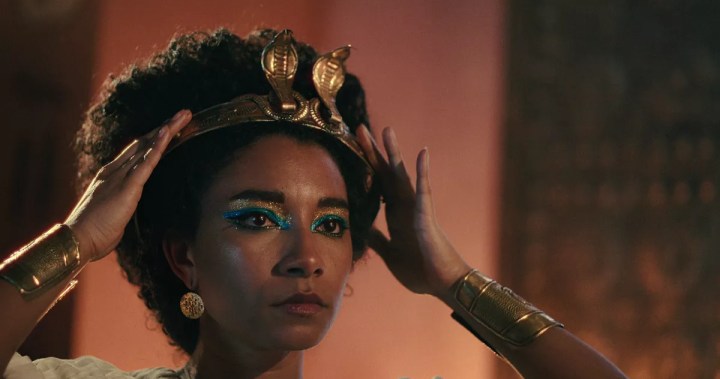A Black Queen Cleopatra? Egyptians lash out at Netflix’s depiction – National | Globalnews.ca
Debates about the colour of Cleopatra’s skin have been reactivated, and this time it’s Egypt attempting to take Netflix to task.
The country has accused the streaming giant of misrepresenting history by casting a mixed-race woman to play the titular character in their upcoming show Queen Cleopatra.
Netflix released a trailer for the four-part docudrama last week, which stars Adele James as Cleopatra.
This week, the Egyptian Ministry of Tourism and Antiquities weighed in on the ongoing controversy, posting a lengthy statement to Facebook.
The statement, credited to the country’s Secretary General of the Supreme Council of Archeology, said that many experts in Egypt agree that “Queen Cleopatra was light-skinned and (had) Hellenic features.”
It also argues that the documentary nature of the series, which is produced by Jada Pinkett-Smith, “requires those in charge of its production to investigate accuracy and rely on historical and scientific facts.”
The ministry points to coins and statues from the time, arguing that they show a light-skinned woman, in keeping with Cleopatra’s Macedonian Greek ancestry.
For Mostafa Waziri, head of the Supreme Antiquities Council, depicting the Cleopatra as Black is nothing less than “a falsification of Egyptian history.”
He added that his complaint is “far from any ethnic racism, stressing full respect for African civilizations and for our brothers in the African continent that brings us all together.”
Cleopatra was born in the Egyptian city of Alexandria in 69 BCE and was the last queen of a Greek-speaking dynasty founded by Alexander the Great’s Macedonian general Ptolemy.
Her ethnicity has been hotly debated, but historians have been unable to pin down the identity of Cleopatra’s mother. It’s possible, historians say, that Cleopatra’s mother may have been an indigenous Egyptian or from somewhere else in Africa.
In February, Neflix companion website Tudum reported that the choice to cast James was “a nod to the centuries-long conversation about the ruler’s race.”
Egypt’s foremost archaeologist Zahi Hawass, however, says there’s nothing to debate.
“I’m not anti-Black at all but I found it my duty as a rich man to state the facts and declare that Cleopatra was not brown. Cleopatra was not Black,” he wrote on Facebook.
“Cleopatra was like the Macedonian princesses and queens and if we look at the statues of the queen and the coin, we cannot find any evidence to support the claim that Cleopatra was brown,” he continued.
Egyptian lawyer Mahmoud Al-Semary is so riled up by Netflix’s depiction that he has filed a case with the public prosecutor to shut down Netflix in Egypt.
The Egypt Independent reports that Al-Semary’s case demands that legal action be taken against those responsible for making the documentary and accused them of “forgery.”
“In order to preserve the Egyptian national and cultural identity among Egyptians all over the world there must be pride in the makings of such work,” he wrote.
Series director Tina Gharavi defended the casting choice in a first-person essay for Variety published last week.
“Doing the research, I realized what a political act it would be to see Cleopatra portrayed by a Black actress. For me, the idea that people had gotten it so incredibly wrong before — historically, from Theda Bara to Monica Bellucci, and recently, with Angelina Jolie and Gal Gadot in the running to play her — meant we had to get it even more right. The hunt was on to find the right performer to bring Cleopatra into the 21st century,” she wrote.
“Why shouldn’t Cleopatra be a melanated sister? And why do some people need Cleopatra to be white? Her proximity to whiteness seems to give her value, and for some Egyptians it seems to really matter.”
In the essay, Gharavi details a “huge online hate campaign” that has been targeted at her since she signed on to the project.
“Egyptians accused me of ‘blackwashing’ and ‘stealing’ their history. Some threatened to ruin my career — which I wanted to tell them was laughable. I was ruining it very well for myself, thank you very much!”
However, she admits that “we don’t know for sure” whether Cleopatra was Black.
“But we can be certain she wasn’t white like Elizabeth Taylor,” she concludes, adding that there needs to be more conversations around internalized white supremacy.
© 2023 Global News, a division of Corus Entertainment Inc.
For all the latest entertainment News Click Here






